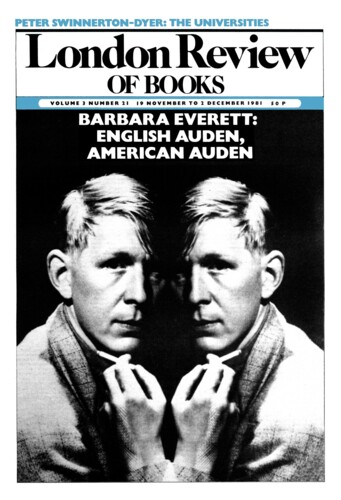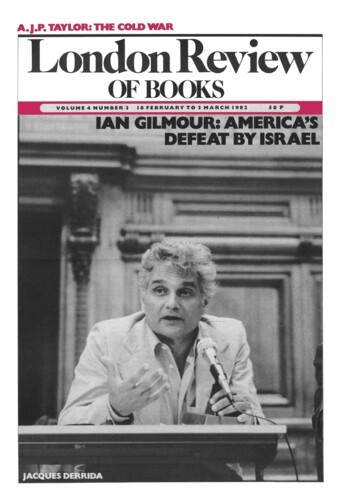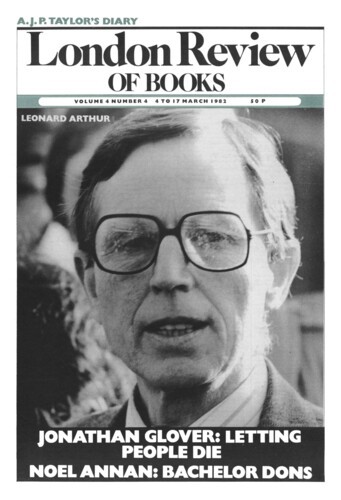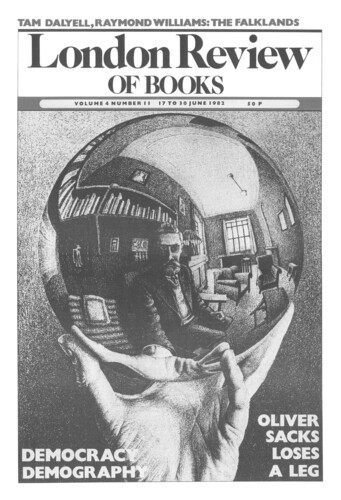Claude Rawson
Claude Rawson is a professor of English at the University of Warwick. His books include Henry Fielding and the Augustan Ideal under Stress and Gulliver and the Gentle Reader. He is editor of the Modern Language Review.
Lordly Accents
Claude Rawson, 18 February 1982
In Fielding’s Journey from this World to the Next the author comes upon Shakespeare in Elysium, standing between the actors Betterton and Booth, who are disputing about the exact emphasis of a line from Othello. Shakespeare is very lofty about it all: ‘it is so long since I wrote the line, I have forgot my meaning,’ but if any of their conjectures is right, ‘it doth me very little honour.’ He is then asked about ‘some other ambiguous passages in his works’ and, as is proper for an author talking to critics, deals even more haughtily with those who ‘gird themselves at discovering obscure beauties in an author’: ‘The greatest and most pregnant beauties are ever the plainest and most evidently striking; and when two meanings of a passage can in the least ballance our judgments which to prefer, I hold it a matter of unquestionable certainty that neither of them is worth a farthing.’
Epireading
Claude Rawson, 4 March 1982
Denis Donoghue begins, a little self-indulgently, by reprinting six short BBC talks on ‘Words’. The excuse is that such radio talks offer a simple if incomplete model for Donoghue’s conception of literary discourse: as an address to an invisible audience, or dialogue for ever aborted by the absence of a second party. Print, unlike radio, is silent. But the writer also seeks a ‘communion’ which is never achieved, and ‘style’ is his compensation for the lack, as ‘culture is a compensation for the frustrations attendant upon biological life.’
Faculty at War
17 June 1982
Kelpers
Claude Rawson, 17 June 1982
The title poem of St Kilda’s Parliament is about a local institution ‘quite unlike Westminster’, a gathering ‘by interested parties to discuss the day’s work and any other issues that needed to be talked over’:
Pieces about Claude Rawson in the LRB
A Spot of Firm Government: Claude Rawson
Terry Eagleton, 23 August 2001
It is remarkable how many literary studies of so-called barbarians have appeared over the past couple of decades. Representations of Gypsies, cannibals, Aboriginals, wolfboys, noble savages:...
Uppish
W.B. Carnochan, 23 February 1995
Item: in 1684, there appeared John Oldham’s posthumous Remains in Verse and Prose, with a prefatory elegy by John Dryden, ‘Farewell, too little and too lately known’....
Denis Donoghue writes about the Age of Rawson, and Rogers
Denis Donoghue, 6 February 1986
Now that the main ideas at large in the 18th century have been elaborately described, students of the period have been resorting to more oblique procedures. In 1968, in The Counterfeiters, Hugh...
Masters
Christopher Ricks, 3 May 1984
The life of Swift by Irvin Ehrenpreis is a great act of consonance. But one reviewer has deprecated the fact that Ehrenpreis does not write with Swift’s genius. So the first thing to say is...
Read anywhere with the London Review of Books app, available now from the App Store for Apple devices, Google Play for Android devices and Amazon for your Kindle Fire.
Sign up to our newsletter
For highlights from the latest issue, our archive and the blog, as well as news, events and exclusive promotions.




